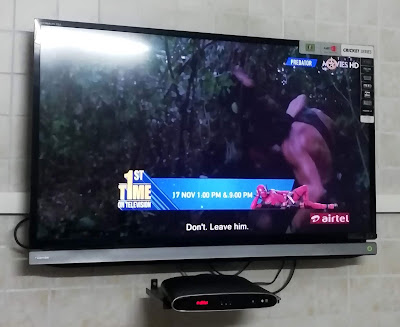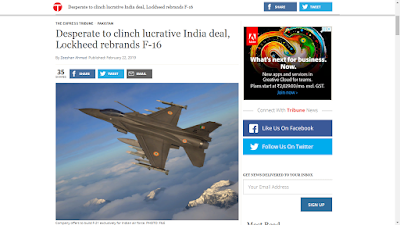Kellogg's Muesli pack shows many large-sized photos of fruits, cereals, and other tempting stuff, but what's shown isn't what's inside. The proportion of the displayed photo that corresponds to dried fruits isn't the same proportion that actually comes out from the box. More like half or maybe just one-quarter in reality. This is fraud going on to fool the public. These private American companies shouldn't be allowed to show something else and sell something that's significantly inferior to what you're advertising. Especially the quantity and proportion of fruits - because fruits are what you're highlighting the most on the box.
Sunday, November 3, 2019
Monday, October 28, 2019
TV channels are overlaying various forms of ads, messages directly over the running movie or TV program, thus interrupting the viewing experience [COMPACTIDEA]
We pay for cable TV channels in the form of DTH subscription fee - and additionally we also bear adverts that are played during - sometimes long - commercial breaks. Why then, should we be made to bear with the various forms of additional ads, distractions and messages/notifications that are increasingly being overlayed directly above the ongoing film or TV serial by ever-greedy TV channels?
More nonsense. They're themselves killing their own businesses - this aggressive overlaying will push more and more folks towards streaming-only Web services.
Saturday, October 26, 2019
Some airlines, such as Ryanair, have either already renamed or are contemplating renaming their Boeing 737 MAX aircraft to fool their customers [COMPACTIDEA]
You can always count on private companies to do everything possible to fool the general public so that these companies can keep selling more and more - safety and honesty be damned.
Saturday, October 12, 2019
Online retail services such as Amazon, Flipkart, etc., in many cases, fool their customers by manipulating list prices, to make discounts look bigger [COMPACTIDEA]
Whatever has been listed in these two articles appears not only deceptive and unethical, but also outright illegal. I have myself observed first-hand some tricks being played by Indian online retail services in order to fool the public. For example, if something was selling for INR 349 yesterday, and today you mark it down by just 1 INR [now INR 348] and label a flashy-looking "Deal of the day" tag on it, that's technically okay but practically useless and also unethical. Changing list prices, however, is altogether another level of fraud.
Sunday, July 7, 2019
American companies keep repeating that health, privacy, safety, etc., are their first priorities even when it has been demonstrated that they're lying [COMPACTIDEA]
Typical of all/most large US giants. It's like business schools and MBAs have sort of force-fed them that you must always keep repeating sentences such as "Safety is at the heart of everything we do", or "Customer privacy is always our first priority", etc., even when faced with undeniable evidence that you're lying and that money and profits are your only/primary goals. Every press release, every public statement, etc., must always include such standard lines.
A good example is the currently ongoing Boeing 737 Max fiasco. Even when several of Boeing's deliberately money-driven design decisions have been exposed [decisions which reduced safety and Boeing knew that these decisions reduced safety], Boeing executives continue to parrot the aforementioned fake statements.
Thursday, April 4, 2019
The MCAS system in Boeing's 737 MAX aircraft is not simply an anti-stall or stall prevention system - Boeing is not going beyond the call of duty for passenger safety
Most media outlets these days are referring to MCAS as an anti-stall or stall-protection system. Even Wikipedia. This is not a completely correct description of this "feature". Boeing was forced to add this system because of an inherent aerodynamic issue with the 737 MAX aircraft. As such, it's more of a "fix" or a "patch" to counteract what is fundamentally a design problem with the plane. Repeatedly describing it to the public as an "anti-stall" "feature" makes the public feel like maybe this system is an extra safety system that has been thankfully/thoughtfully added by the very safety-minded Boeing to prevent stalls [thus increasing the safety of an already-safe airliner], and that the system has some temporary software glitches currently, and that by correcting those glitches the system will be free of flaws and the airplane will become very safe. The crucial point that this sort of story omits, perhaps deliberately, is that this feature/system is not intended to add to the basic safety of a safe aircraft design. Rather, it tries to make an unsafe aircraft design safe.
Boeing is in no way going beyond the call of duty to ensure the safety of flying public. On the contrary, this only-profit-minded company sold a warning indicator [the "AOA Disagree" light] as an optional extra to be purchased by airlines, rather than installing it as standard equipment in the interest of safety. Much like leather seats or tinted glasses are sold by car manufacturers as an extra.
Monday, February 25, 2019
Lockheed has been unable to sell its F-16 fighter jet to India, so it put the same old wine in a new bottle - it starts calling it F-21
Ideally, this kind of trick should be outlawed. You shouldn't be allowed to take the decades-old / existing F-16, create a slightly different / superior variant of the same base plane, and start calling it F-21, covertly whispering to potential buyers that it's just one step short of America's flagship - the F-22 [when in fact it isn't]. Lockheed Martin's F-16 bid failed in India because of these reasons - cost, capability, technology-transfer, industrial cooperation [offsets], threat of future sanctions, and Pakistan [Pakistan already has F-16s]. Lockheed realized that the name "F-16" is more of a baggage than an asset here in India. So it changed the name of the offering to F-21. Losers!
Subscribe to:
Posts (Atom)





